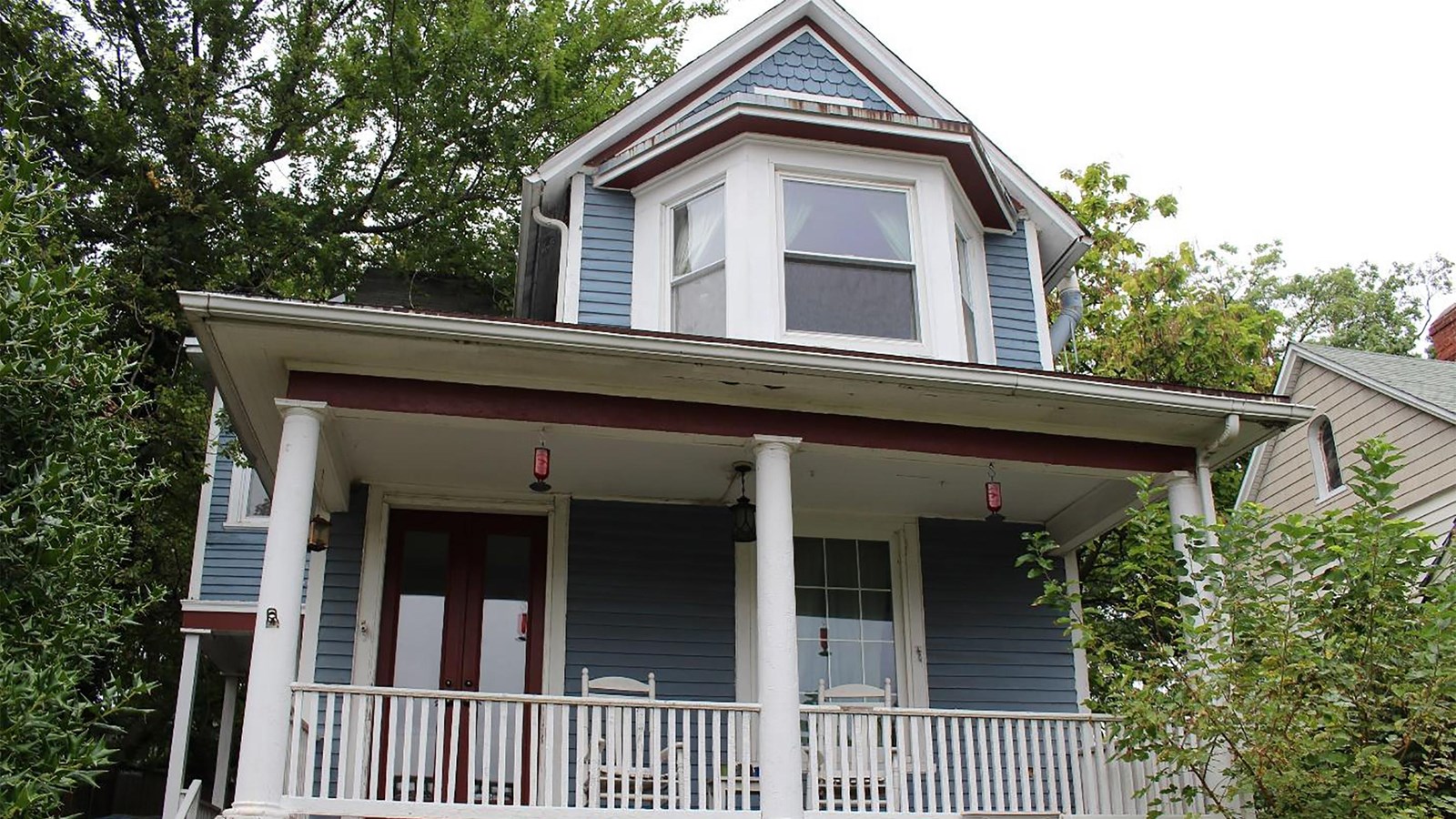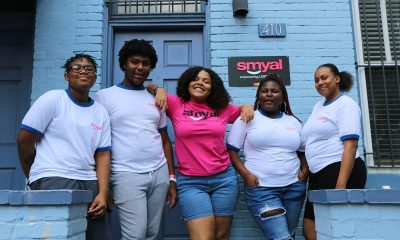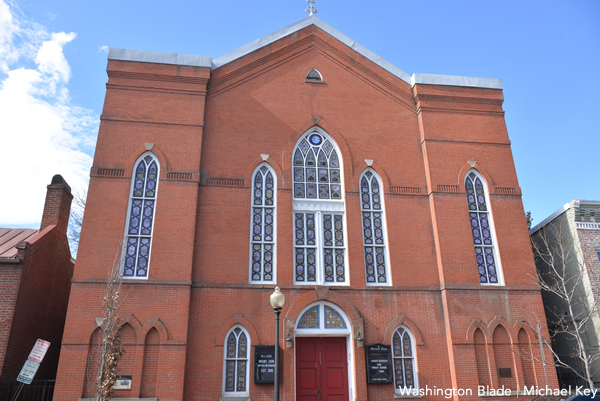Local
Will the Slowe-Burrill House become a National Landmark?
Process raises questions about what constitutes LGBTQ history

On Oct. 5, 2020, the Slowe-Burrill House was put on the National Register for Historic Places for its association with Lucy Diggs Slowe, most recognized for her work as the first Dean of Women at Howard University, where she served from 1922 until her death in 1937.
Even before her appointment at Howard, she boasted an extraordinary vitae. As an undergraduate at Howard, she was a founding member of the first sorority for African-American women. After graduating valedictorian of her class, and earning her master’s at Columbia University, Slowe took a position teaching at the Armstrong Manual High School in D.C., where she so impressed the school board that they appointed her to found the first-ever junior high school for African Americans in the national capital region.
As Tamara Beauboeuf-Lafontant describes in her book-length study of Slowe’s deanship, “To Live More Abundantly,” Slowe’s tenure at Howard was defined by her advocacy for what she called the “New Howard Woman” in her inaugural address to the students, a woman who was “of extreme culture and refinement.” She worked tirelessly, often at odds with the administration, to encourage the women of Howard to pursue the social sciences, not just the liberal arts thought to befit future mothers, and to explore careers outside of teaching, which was, as Slowe described, “the only occupation which is open to them with few handicaps.” Slowe was unsatisfied with the absence of women’s housing on campus, which she argued was necessary as a “laboratory for practical education in human relationships,” and orchestrated funding from Congress to build three new dormitories for a Women’s Campus. Slowe was so successful in her projects that, as one student reported, “we spoke among ourselves of our dean, not as Dean Slowe but as Dean Swift.”
Given Slowe’s remarkable life, and the National Park Service’s registration of her house as a historic site in recognition of that life, one would be forgiven for wondering why the site is titled the “Slowe-Burrill House” after both Slowe and her life partner, Mary Burrill. While the National Register nods to Burrill’s career as a teacher and playwright, it makes clear her historical significance is primarily as Slowe’s partner. The title of the site is less in recognition of Burrill herself than of Slowe and Burrill’s same-sex relationship at a time in which it would have been especially risky for a public figure like Slowe. While Slowe and Burrill were able to frame their partnership within 19th century ideals of romantic friendship, those ideals were coming under increasing scrutiny by the 20th century, which saw the pathologizing of women’s intimate relationships in the growing medical discourse around sexuality.
Now the Slowe-Burrill House is up for nomination as a National Landmark at the next meeting of the National Historic Landmark Committee this spring. Dr. Susan Ferentinos, a specialist in LGBTQ public history, was contacted by the National Park Service back in 2016 to help identify potential landmarks related to LGBTQ history. Ferentinos noticed there was a particular absence of LGBTQ landmarks in D.C., and put together a shortlist of sites including the Slowe-Burrill House. Ferentinos has been working through that list since, most recently preparing a national landmark nomination for the Furies Collective, which the Blade reported on in November.
But the bar for a National Historic Landmark is far higher than for the National Register of Historic Places. Only 3% of items on the National Register earn a further designation as a National Historic Landmark, and the priority for federal funding that goes with it. Will the Slowe-Burrill House meet that higher bar?
One way a site gets approved is by association with a nationally significant figure, and Lucy Diggs Slowe certainly has the national standing required. As Dean of Women, her work extended far beyond the campus of Howard University. Slowe established the National Association of College Women, an alumnae organization for Black women college graduates across the country. Under her leadership, the organization raised money to help young Black women attend college, worked to institutionalize gender equity in higher education, and led initiatives to foster interracial understanding with white college alumnae. Slowe was the first Black member of the National Association of Deans of Women, where she endlessly fielded her white peers’ concerns with racial matters on campus. And Slowe served on the national board of Young Women’s Christian Association, which gave her the connections she needed to go on a cross-country tour of colleges to talk about race relations among college women.
But if Slowe’s impact on women’s and African-American history on a national level is undoubtable, things are less clear when it comes to her mark on LGBTQ history. Slowe’s relationship with Burrill was a private matter, and not one she sought to advertise on the national stage. If Slowe’s house becomes a national landmark, will it still be as the Slowe-Burrill House? Or just the Slowe House?
That question arose early in Ferentinos’s work with Kathryn Smith, the National Historic Landmarks Coordinator for the Capital Region. On an early draft for the nomination, Dr. Ferentinos got the feedback that perhaps Slowe wasn’t really a national figure in LGBTQ history, and that they should be focusing on other criteria of national significance. But Ferentinos, who made it clear she does not speak for the National Park Service, vehemently disagreed. “I said to [Kathryn Smith], I feel so strongly that this property is significant to LGBTQ history. What this feedback is telling me is that I haven’t done a good enough job yet. I’m willing to do a couple extra rounds of revision … in order to do this right because it is really important.”
As Dr. Ferentinos sees it, LGBTQ history is often simply figured as a history of political activism, which excludes the huge number of folks who managed to carve out a professional life while leading a life as LGBTQ, however private it may have been. And if she’s ever going to get a chance to nominate someone who represents this broader vision of LGBTQ history, it’s Slowe.
It is well known that at the end of her career, Slowe had a protracted fight with the president of Howard University, Mordecai Johnson. Despite having arranged in her contract to live off-campus, as all male deans did, Johnson was intent on forcing Slowe to live on campus, so that she could better supervise the students — and from a shanty next to the college dump. Slowe fought Johnson to defend her contract right up until her death. While Slowe was dying from pneumonia in her bed, instead of appointing an interim dean, Johnson issued her an ultimatum: report to work or be replaced. Burrill refused to answer the demand, and a replacement was named. Slowe died a month later, on Oct. 21, 1937.
As Beauboeuf-Lafontant describes it in her book, this story is yet another example of Slowe’s fight for gender equality, to have the rights and privileges afforded to male deans. But while Beauboeuf-Lafontant makes no mention of the role Slowe’s relationship with Burrill played in this tale, Ferentinos thinks it was a central factor. “There are memos that could seem very innocent [to] a historian who is not trained in LGBTQ history,” Ferentinos explained. There would be a memo, for instance, asking Slowe to give an account of the financial hardship the move would cause her. “It could seem like a bureaucratic crossing of Ts,” Ferentinos said. “Or it could be read as calling her bluff. It wouldn’t cause her a financial hardship, it would cause her partner a financial hardship.”
Kathryn Smith reported being satisfied with Ferentinos’s revisions of the nomination, but was cautious about predicting whether or not they would succeed. “We are supportive of the arguments she’s making, but it will ultimately be up to the NHL [National Historic Landmark] committee to determine and to make the recommendation as to whether this argument will stand.” At stake here is more than just Slowe. Is LGBTQ history just the history of figures who publicly advocated the rights of queer people? Or is it also the history of those who worked to build whatever life they could, no matter how private they kept it?
(CJ Higgins is a postdoctoral fellow with the Alexander Grass Humanities Institute at Johns Hopkins University.)
Rehoboth Beach
Former CAMP Rehoboth official sentenced to nine months in prison
Salvator Seeley pleaded guilty to felony theft charge for embezzlement

Salvator “Sal” Seeley, who served as an official with the Rehoboth Beach, Del., CAMP Rehoboth LGBTQ community center for 20 years, was sentenced on April 5 by a Sussex County Superior Court judge to nine months in prison and to pay $176,000 in restitution to the organization.
The sentencing took place about five weeks after Seeley pleaded guilty to a charge of Theft in Excess of $50,000 for allegedly embezzling funds from CAMP Rehoboth, a spokesperson for the Delaware Department of Justice told the Washington Blade.
Seeley’s guilty plea came shortly after a grand jury, at the request of prosecutors, indicted him on the felony theft charge following an investigation that found he had embezzled at least $176,000 from the nonprofit LGBTQ organization.
“Salvatore C. Seeley, between the 27th day of February 2019 and the 7th day of September 2021, in the County of Sussex, State of Delaware, did take property belonging to CAMP Rehoboth, Inc., consisting of United States currency and other miscellaneous property valued at more than $50,000, intending to appropriate the same,” the indictment states.
“The State recommended a sentence of two years of incarceration based on the large-scale theft and the impact to the non-profit organization,” Delaware Department of Justice spokesperson Caroline Harrison told the Blade in a statement.
“The defense cited Seeley’s lack of a record and gambling addiction in arguing for a probationary sentence,” the statement says. “Seeley was sentenced in Superior Court to a nine-month prison term and to pay a total of $176,000 in restitution for the stolen funds,” Harrison says in the statement.
Neither Seeley nor his attorney could immediately be reached for comment.
At the time of Seeley’s indictment in February, CAMP Rehoboth released a statement saying it first discovered “financial irregularities” within the organization on Sept. 7, 2021, “and took immediate action and notified state authorities.” The statement says this resulted in the investigation of Seeley by the state Department of Justice as well as an internal investigation by CAMP Rehoboth to review its “financial control policies” that led to an updating of those policies.
“As we have communicated from day one, CAMP Rehoboth has fully cooperated with law enforcement,” the statement continues. “At its request, we did not speak publicly about the investigation while it was ongoing for fear it would jeopardize its integrity,” according to the statement. “This was extremely difficult given our commitment to transparency with the community about day-to-day operations during the recent leadership transition.”
The statement was referring to Kim Leisey, who began her job as CAMP Rehoboth’s new executive director in July of 2023, while the Seeley investigation had yet to be completed, following the organization’s process of searching for a new director. It says Seeley left his job as Health and Wellness Director of CAMP Rehoboth in September of 2021 after working for the organization for more than 20 years.
“Mr. Seeley’s actions are a deep betrayal to not only CAMP Rehoboth but also the entire community we serve,” the statement says.
Maryland
Christian Siriano to serve as grand marshal of Annapolis Pride Parade
Fashion designer is an Annapolis native

BY JOHN-JOHN WILLIAMS IV | He’s conquered fashion week. His designs have slayed the red carpet during award season. And now Christian Siriano is coming home.
The Annapolis native will serve as grand marshal and keynote speaker June 1 for the annual Annapolis Pride Parade and Festival, which is a major coup as the event enters its fourth year.
The rest of this article can be read on the Baltimore Banner’s website.
District of Columbia
As You Are bar closes temporarily, citing problems with building
Shutdown comes two months after fundraising appeal brought in $170,000

As You Are, the LGBTQ café and bar located in the Barracks Row section of Capitol Hill near the Eastern Market Metro station, has announced on its Instagram page that problems associated with its building at 500 8th St., S.E., forced it to “temporarily” close on April 8.
“As you may be aware, As You Are’s location in Eastern Market has been closed since April 8, when we began to have concerns about the physical condition of the building,” the Instagram message states. “We worked quickly to alert our landlord, and they have assessed the building with their engineers,” the message says.
“We understand that certain repairs need to be made to ensure the safety of our staff, patrons, and community,” the message concludes.
In one of two more recent videos posted on Instagram on April 17 and 26, As You Are co-owners Jo McDaniel and Rachel Pike said they did not have any update on when they can reopen. “The engineers and contractors have all come into the space, and we’re just waiting on a plan and a timeline from our landlord,” McDaniel said in the video.
Pike mentioned in one of the videos that As You Are has a Venmo app set up, and said they appreciate the support they have been receiving from the community. McDaniel added, “We’re really interested in supporting our team through this, as this is an unexpected loss of income for all of us.”
McDaniel didn’t immediately respond to a request from the Washington Blade for a further update on where things stand with the building repair project and the specific nature of the problems with the building. An earlier message posted on the As You Are website said, “Heavy rain damaged the back wall of our building, and we are closed to assess and repair.”
The message added, “Regular updates and ways to support can be found on our Instagram page @asyouaredc.”
The April 8 shutdown came a little over two months after As You Are issued a GoFundMe appeal on Feb. 5 seeking emergency financial support to prevent it from closing in February due to a $150,000 debt. In a display of strong community support, its $150,000 fundraising goal was reached in less than a week. By the following week, the GoFundMe appeal had pulled in more than $170,000 from more than 3,000 individual donations.
Many of the donors left messages on the GoFundMe page for As You Are expressing their strong support for the bar and café, saying it served as a uniquely supportive space for all members of the LGBTQ community.
In the GoFundMe message, McDaniel and Pike said their goal in opening their business in March 2022 was to offer community center type programming beyond just a bar and café.
“AYA is a café, bar and dance floor that hosts diverse programming nearly every night of the week, including social sport leagues, Queer youth socials, weekly karaoke, book clubs, open mics, Queer author events, dance parties, and much more,” the two said in their message.
The building’s owner and the As You Are landlord, Rueben Bajaj, who is the principal operator of the Bethesda, Md., based real estate firm White Star Investments, couldn’t immediately be reached for comment. The Washington Post reported that he contributed $500 to the As You Are GoFundMe appeal, saying, “I personally want to see As You Are succeed.”




















